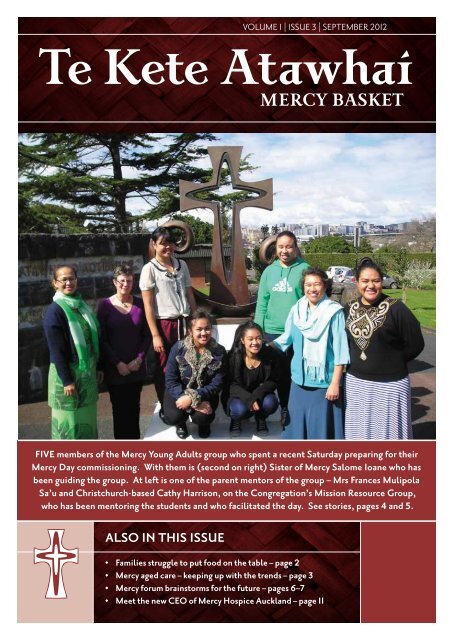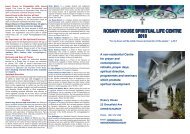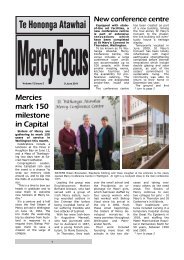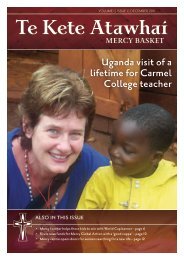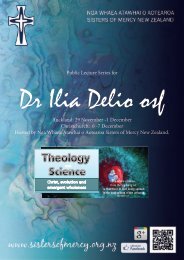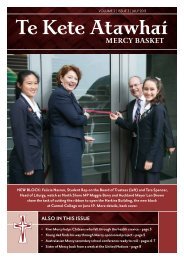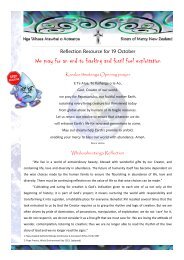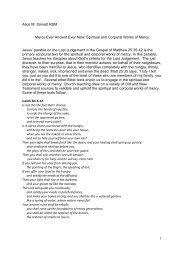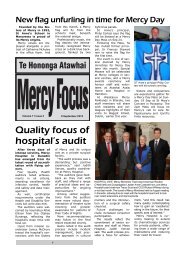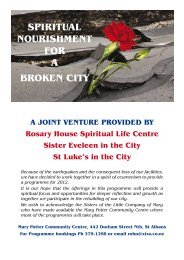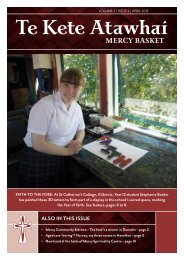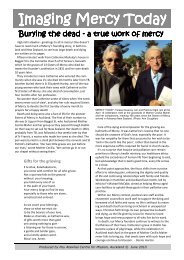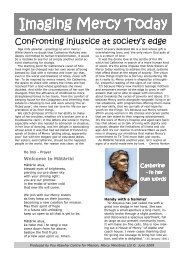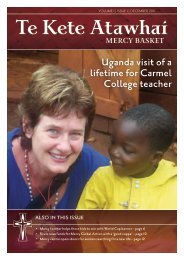Te Kete Atawhai Volume 1 Issue 3 September 2012
Te Kete Atawhai Volume 1 Issue 3 September 2012
Te Kete Atawhai Volume 1 Issue 3 September 2012
Create successful ePaper yourself
Turn your PDF publications into a flip-book with our unique Google optimized e-Paper software.
<strong>Volume</strong> 1 | <strong>Issue</strong> 3 | september <strong>2012</strong><br />
<strong>Te</strong> <strong>Kete</strong> <strong>Atawhai</strong><br />
Mercy basket<br />
FIVE members of the Mercy Young Adults group who spent a recent Saturday preparing for their<br />
Mercy Day commissioning. With them is (second on right) Sister of Mercy Salome Ioane who has<br />
been guiding the group. At left is one of the parent mentors of the group – Mrs Frances Mulipola<br />
Sa’u and Christchurch-based Cathy Harrison, on the Congregation’s Mission Resource Group,<br />
who has been mentoring the students and who facilitated the day. See stories, pages 4 and 5.<br />
also in this issue<br />
• Families struggle to put food on the table – page 2<br />
• Mercy aged care – keeping up with the trends – page 3<br />
• Mercy forum brainstorms for the future – pages 6–7<br />
• Meet the new CEO of Mercy Hospice Auckland – page 11
Putting food on the table<br />
a struggle for many families<br />
Sisters of Mercy mounting a demonstration outside<br />
Parliament during April feature in Our Daily Bread: Putting<br />
Food on the Table, this year’s Social Justice programme,<br />
sponsored by Caritas Aotearoa New Zealand during the<br />
second week of <strong>September</strong>.<br />
The annual observance was established by the New Zealand<br />
Catholic Bishops and entrusted to Caritas to lead, inviting Catholics<br />
and the wider community to consider a current social justice issue in<br />
the light of Catholic social teaching.<br />
This year, a 30-page booklet focuses on the struggle many families<br />
have to put food on the table. In their foreword, the Catholic Bishops<br />
note that an estimated 925 million people around the world go hungry.<br />
Even in New Zealand, 33.7 percent of the population live with low<br />
to moderate food insecurity, and 7.3 percent live with severe food<br />
insecurity.<br />
“This means children arriving at school hungry with nothing<br />
for lunch, or families having inadequate diets. People who don’t<br />
have enough money often have no choice but to live on cheap<br />
carbohydrates and fat, leading to health conditions such as diabetes. In<br />
developed countries like New Zealand, obesity can be a manifestation<br />
of hunger.”<br />
Resolving hunger and food insecurity requires political will and<br />
commitment, say the bishops. “When food-insecure households are<br />
found in New Zealand among those receiving wages as well as among<br />
beneficiaries, and hungry children are found at schools from Northland<br />
to Southland, community and structural responses are required.”<br />
The bishops say that participation in the Eucharist demands<br />
that Christians address the needs of people who do not have what<br />
they need to survive, including those in our own country. And they<br />
As Mercy folk around the world<br />
prepare to keep this feast once more, we’ve<br />
invited a couple of local Sisters of Mercy<br />
to share their thoughts about this day. The<br />
first is Sr Stephanie Kitching who is the<br />
Congregation Archivist in Wellington.<br />
“I strongly believe Catherine’s heritage<br />
of Mercy will endure, though I can’t be sure<br />
in what form or through what means this<br />
will happen,” she says. “Catherine had great<br />
confidence in the providence of God, and<br />
worked tirelessly for those in need.<br />
“We who are inspired by Mercy are<br />
called to this trust. It’s said that those who<br />
give receive more in return. I have a deep<br />
gratitude for this and know that God is with<br />
us on our journey in this wonderful universe<br />
of ours. I look to the Mercy future with<br />
peace and assurance.”<br />
We asked Stephanie to say what she<br />
thinks Catherine McAuley would be most<br />
delighted to see, if she were to join us today.<br />
She names the situations where she has<br />
seen Mercy at work in the past few weeks:<br />
“In one of our older sisters who is now in<br />
hospital, who shares her life and faith, not<br />
just with other patients who seek her out,<br />
but with staff who are glad to be caring for<br />
her. In one of our Mercy colleges, where I’ve<br />
seen a student’s urgent needs being deeply<br />
cared for. In a gathering of young women<br />
exploring Mercy with our sisters. In the<br />
building up of a food bank for the hungry.<br />
“My experience will be multiplied by<br />
others throughout Aotearoa New Zealand.<br />
As Catherine once noted, ‘we can never say,<br />
it is enough’.”<br />
We asked Stephanie if there are signs<br />
of hope she can point to, where Mercy is<br />
blooming freshly in our midst. “Apart from<br />
the increasing commitment of our amazing<br />
companions in Mercy, one key sign is that<br />
young women are now asking questions<br />
and wanting to know more about Mercy,”<br />
WITNESS: Sisters of Mercy, joined by staff of Caritas Aotearoa NZ, display<br />
their banners before Parliament Buildings last April, supporting the UN<br />
conference on sustainable development. Seated left is Katrina Fabish<br />
rsm who led the initiative; kneeling on right is Congregation Leader Anne<br />
Campbell rsm. (Photo by Martin de Jong, Caritas NZ)<br />
quote Pope Benedict who wrote in his encyclical, God is Love, “A<br />
Eucharist that does not pass over into the concrete practice of love is<br />
intrinsically fragmented.”<br />
The booklet features a collective ‘witness to Rio’, mounted by<br />
Sisters of Mercy outside Parliament for two weeks in April, which drew<br />
attention to the call for ethical considerations at the UN Conference<br />
on Sustainable Development held in Brazil last June.<br />
Led by Katrina Fabish rsm, the demonstration was part of<br />
a campaign by Sisters of Mercy around the world, pressuring<br />
governments for action to ensure a healthy and just planet that feeds<br />
all its people. The Caritas booklet quotes a 2011 report of a working<br />
group of the Pontifical Academy of Science, insisting that “if we want<br />
justice and peace, we must protect the habitat that sustains us.”<br />
Hopes and dreams as another Mercy Day dawns<br />
Celebrated each year on <strong>September</strong> 24, Mercy Day recalls the opening of the first House of Mercy in 1827, built<br />
by Catherine McAuley in Baggot Street, Dublin as a centre for her ministries among the poor and ill in that city.<br />
SR Stephanie Kitching .... ‘Mercy is God’s<br />
work,not ours.’<br />
says Stephanie.<br />
“They are caring for others and for our<br />
universe in new and diverse ways. I hope<br />
we can encourage them and stay alongside<br />
them in their search, while remembering<br />
that Catherine also insisted that ‘the Order<br />
is God’s work, not ours’.”<br />
Aged care – keeping up with new and rising needs<br />
When Judy Hindrup was appointed CEO in 1992, Assisi Home and Hospital in Hamilton was in the care of an order<br />
of Franciscan Sisters. When they returned to England, the facility was taken over in 1994 by the Sisters of Mercy.<br />
The Franciscan and Mercy values both fit well with her<br />
own beliefs about the dignity of older people, says Judy. “Compassion<br />
and care of the poor were central to Catherine McAuley’s vision. Our<br />
core values are the focus of staff training. Mission is who we are.”<br />
In her 20 years at the helm, Judy admits that the acuity of residents<br />
has steadily grown. In 1992, residents did not have to be needsassessed<br />
when they came into care, and so long as they met the<br />
funding criteria, they received a government subsidy.<br />
“I can remember a couple who were still driving their cars when I<br />
came here, somewhat unsafely. One drove the car around our grounds,<br />
just to keep the motor in working order. It’s close on 20 years since our<br />
last resident had a car.<br />
“In the early years, the needs of residents were often more social<br />
than clinical. The focus has changed, and we now are expected to<br />
manage much higher needs. We recently had a resident on continuous<br />
peritoneal dialysis, and we often have one or two who require feeding<br />
through stomach tubes. The palliative care needs have become more<br />
complex, as well.”<br />
When her marriage ended in 1972, Judy went looking for a regular<br />
job which allowed her to care for her two-year-old daughter. District<br />
nursing fitted the bill. “I worked my way up in that field, and as funding<br />
for community services grew, I helped to broaden district nursing<br />
services in the wider Waikato region. I could see that, by moving up the<br />
chain, I could have more influence on services for older people.<br />
“When the job at Assisi was advertised in late 1991, I was ready for<br />
a change. I welcomed the chance to work for a not-for-profit agency<br />
that put the needs of residents first. The lack of bureaucracy appealed,<br />
too – keeping me closer to staff on the ground.”<br />
Over the years, Judy says the issues of caring for older people have<br />
remained the same. “In a sense, they’ve become more important, as I<br />
get closer to retirement myself!”<br />
Arriving at Assisi in March 1992, Judy admits she was on a steep<br />
learning curve. “Within my first four months, I attended my first<br />
Australian Catholic Healthcare Conference. Being immersed in things<br />
Catholic was a new challenge.”<br />
Among her achievements<br />
in the past two decades, Judy<br />
lists the building of three new<br />
wings, two refurbishments<br />
of the whole facility, and the<br />
gaining and maintaining of a<br />
three-year certification, one<br />
of the first 50 facilities in New<br />
Zealand to do so.<br />
She is proud, too, of Assisi’s<br />
accreditation record – first<br />
gained in 1996 and held<br />
continuously ever since, with<br />
a four-year accreditation<br />
achieved this year, with no<br />
fewer than seven notations for<br />
excellence. “This demonstrates<br />
JUDY HINDRUP (left), CEO of <strong>Atawhai</strong><br />
Mercy Assisi, with Anne Littlejohn<br />
who is supervisor for ISS Property<br />
Management Services. Judy holds the<br />
quality manual for cleaning services<br />
at the facility which Anne has recently<br />
compiled.<br />
clearly that we are focussed<br />
on best practice.”<br />
Judy says that her biggest<br />
challenge has probably come<br />
in the past two years, with the<br />
opening of 16 new hospital<br />
beds and the addition to the<br />
facility of half as many more<br />
CEO Judy Hindrup (second on right) at the opening in 2010 of Mercy Court,<br />
a 16-bed hospital wing at <strong>Atawhai</strong> Mercy Assisi in Hamilton. Also pictured<br />
(from left) are Mercy Healthcare board chairman Denis Wood, Health<br />
Minister Tony Ryall, Congregation Leader Sr Anne Campbell, and Mercy<br />
Healthcare Auckland CEO Peter Buckland.<br />
hospital residents and staff. This has meant a change in culture and<br />
new challenges for management. “Added to this has been a rise in the<br />
employment of staff with English as a second language.”<br />
Judy says her strength has come from her family, support from<br />
Sisters of Mercy, and excellent long-serving staff in key positions.<br />
She also pays tribute to Peter Buckland, CEO of Mercy Healthcare<br />
Auckland, “whose position has been critical.”<br />
In her 20 years at Assisi, social attitudes have changed, says Judy.<br />
“Older people are seen - perhaps by an increasing number of younger<br />
people – as a burden on society. They are seen as taking up a larger<br />
portion of Vote health than the general population.<br />
“There is resentment about older people working past retirement<br />
age, taking up jobs that younger ones could have. They are often seen<br />
as the bigger spenders, blocking the provision of housing for larger<br />
families.<br />
“Funders of our services for older people need to do more longterm<br />
planning, providing better-supported housing that allows older<br />
people to live in the community longer, better connected to the<br />
community in which they have lived for so long.<br />
“We need not just retirement villages, but facilities that are better<br />
connected with the community, providing social as well as care<br />
support.”<br />
Judy has an eye for staff with the right attitudes. “They need to<br />
demonstrate respect – this shows in how they dress and present<br />
themselves at interview. They need to have read the information we<br />
provide and have given some thought to what the job may involve.<br />
“We’re looking for bright personalities, people with a can-do<br />
attitude, who are willing to advance their skills. Perhaps starting as a<br />
caregiver but willing to go on to train as a nurse.<br />
“RNs straight from training need ongoing support in their first year.<br />
This is something we may need to address, in order to attract new RNs<br />
into aged care as a career pathway.<br />
“Maybe this is where a Mercy grant for new graduates might<br />
help, allowing them to be supernumerary for an extended period, but<br />
bonded to stay for a period of time?”<br />
2 3
Commissioning ‘an exciting time’ for young Mercies<br />
Meet two of the Mercy Young Adults who will be commissioned as members of this group at a ceremony in Auckland<br />
on <strong>September</strong> 22. One of them is now at university, the other in her last year at McAuley High School. They talk about<br />
the group and why belonging is important to them....<br />
Meressapinni Pupuali’i is in her first<br />
year at Auckland University, studying for a<br />
Bachelor of Science, majoring in Geography<br />
and specialising in Environmental Science.<br />
She hopes to use her degree to put her faith<br />
into practice, working to find ways of caring<br />
for the environment and sustaining natural<br />
resources.<br />
She was a student at McAuley High School<br />
in Otahuhu for five years, “starting as a keen,<br />
shy Year 9 student in 2007 and graduating<br />
there last year.”<br />
She looks back to her time at McAuley<br />
with thanks for opportunities to foster her<br />
passion for community involvement, “through<br />
the Liturgy committee, St Vincent de Paul,<br />
Caritas, Amnesty International and many<br />
more.<br />
“The best gift I received was a quality<br />
Catholic education, which taught me high<br />
Christian values and also the values of Mercy.<br />
These have already had a huge influence on<br />
my life, giving me the courage to strive for<br />
personal excellence and to be a stronger and<br />
better woman.”<br />
The Mercy values Meressapinni identifies<br />
include service to others, especially those in<br />
need, through volunteer work packing food<br />
parcels for poor families.<br />
She also names her role as a steward<br />
of earth and environment. “I support this<br />
Mercy value by specialising in environmental<br />
science, learning strategies and practices that<br />
will help to preserve and sustain our earth.”<br />
Meressapinni says the Mercy Young Adults<br />
group will help her to uphold the values she<br />
learnt at school. “There are times when I feel<br />
tired and want to give up, because I feel that<br />
it’s all too much. It’s at times like this that I<br />
need to know I’m not alone.<br />
“Belonging to the Mercy Young Adults<br />
will help me to believe in myself. It will boost<br />
my confidence to keep doing the works of<br />
mercy.”<br />
Meressapinni believes the group is very<br />
blessed to have the support and guidance<br />
which Sr Salome brings. “It’s important for us<br />
to have a role model like Salome to inspire us,<br />
and to share her greater knowledge about the<br />
works of Mercy.<br />
“Just seeing a Sister of Mercy like Salome<br />
doing what she does is one of the reasons we<br />
are motivated to be part of the Mercy action.”<br />
But Meressapinni can foresee a time when<br />
Salome’s role may be filled by “a lay person<br />
like myself.<br />
“Although I’m not a Catholic, I strongly<br />
believe it’s possible to see myself in the future<br />
LEFT: Meressapinni Pupuali’i ... inspired by Mercy story to act with compassion.<br />
RIGHT: Filisita Tuiogo .... Mercy values will still be part of our lives, beyond school<br />
working alongside the Sisters of Mercy. This<br />
is because the great inspiration I’ve received<br />
from a Catholic education has developed my<br />
passion to be part of Mercy in action, and the<br />
feeling I have of wanting to do more when<br />
I’ve grown up.”<br />
She says the Mercy Day commissioning<br />
ceremony will mean a new beginning for her.<br />
“It will be the start of a new journey with<br />
other young women, aimed at making a<br />
difference in the world. The commissioning<br />
will also be a blessing for me, bringing<br />
strength and support to go out into the<br />
community to do the works of mercy.<br />
“As our families and friends witness the<br />
ceremony, I will find confidence, knowing that<br />
they have faith in us, and that they support us<br />
in our journey as young Mercy adults.<br />
“I will feel super excited about the<br />
wonderful journey that lies ahead of us, and<br />
also overwhelmed about the chance that’s<br />
given to us to make a change, and to put our<br />
own mark on the world.”<br />
Filisita Tuiogo is in her final year at<br />
McAuley High School, where she says she<br />
is constantly being reminded of Mercy<br />
values, through daily prayer and liturgies. Her<br />
leadership role at school enables her already<br />
to be a role model to younger students. The<br />
best gift she has received from McAuley so<br />
far is “the sisterly bond” she has with other<br />
students.<br />
“When I move on from school, I know that<br />
Mercy values will still an essential part of my<br />
life, especially justice and compassion. But it<br />
will take strong faith and prayer to maintain<br />
these values after I leave school,” Filisita says.<br />
Some of the benefits she hopes to<br />
gain from belonging to the Mercy Young<br />
Adults group include commitment to social<br />
justice, making changes in the community,<br />
emphasising the Christian role through good<br />
deeds, changing lives, and becoming more<br />
aware of the vulnerable in society.<br />
“Having a Sister of Mercy to guide us<br />
has made all the difference,” says Filisita.<br />
“Salome truly keeps our meetings reverent<br />
through a strong focus on prayer, and by her<br />
acknowledgement of each of us who are<br />
present.<br />
“Also, my parents trust Sr Salome and<br />
are ready to let me attend meetings at<br />
her home.” Filisita isn’t sure if a lay person<br />
could fill this role. “It takes commitment,<br />
consistency, reverence and knowledge,” she<br />
says.<br />
Like her older colleague, Filisita is looking<br />
forward to the Mercy Day commissioning<br />
ceremony. “This will mean a lot to me. It will<br />
not only commission individual members but<br />
it will also endorse the group itself.<br />
“This will be our first step towards the<br />
future goals and actions we plan. I’ll be<br />
excited as well as blessed, for the opportunity<br />
to be part of a great group which plans to<br />
work at social justice in our community.”<br />
Young Mercy adults – a dream come true<br />
At a celebration to mark Mercy Day this year, a group of Young Mercy Adults<br />
will be commissioned as members of this newly formed group. The young<br />
women, between 18 and 20, are either doing tertiary studies or in their final<br />
year at McAuley High School in Otahuhu.<br />
The launching of the group fulfils a<br />
dream for Sister of Mercy Salome Ioane, who<br />
is currently chaplain at the school, teaches<br />
RE and visits families as a community liaison<br />
person at the school.<br />
“I’m really excited about this<br />
commissioning ceremony, for the first Mercy<br />
Young Adults to be established in New<br />
Zealand. I want to acknowledge the role of<br />
Katrina Fabish rsm and Cathy Harrison in<br />
helping the process of setting up the group. I<br />
particularly want to thank the Congregation’s<br />
leadership team for giving their blessing to<br />
this initiative.”<br />
The idea for starting the group came when<br />
she attended a conference for Mercy Young<br />
Adults from Australia and Papua New Guinea,<br />
Salome explains. “The groups have been very<br />
active in Australia for some time, and the<br />
conference made me realise that we too have<br />
young people in New Zealand who have been<br />
educated in our Mercy schools and who have<br />
a similar passion.<br />
“They are passionate about our Mercy<br />
values while they are at school, but sadly<br />
much of that ends when they leave school. If<br />
as a Congregation, we create a way of inviting<br />
these young adults to keep their links with<br />
us, we’ll have a group of young people who<br />
will continue to share our passion for bringing<br />
God’s mercy into the community, and for<br />
addressing the social justice issues that arise<br />
in our world.<br />
“The youth of today is the future of<br />
tomorrow. Do these young women hold the<br />
future of the Sisters of Mercy in the next<br />
century? I don’t know. But my expectations of<br />
the group are high.<br />
“I expect these young women to be<br />
committed to the group and to enjoy<br />
being part of it. I expect them to use this<br />
opportunity to develop pathways into their<br />
future careers, and to deepen their awareness<br />
of social justice issues and their responsibility<br />
to others.<br />
“Here’s a chance for them to be a voice<br />
for the marginalised, and to support those<br />
who find little hope in the world. They can<br />
be women of mercy, working to bring God’s<br />
justice into their workplace, and among their<br />
families and friends.<br />
“I expect these young women to enjoy<br />
being who they are, and to value all the gifts<br />
they’ve been blessed with. They can share<br />
these same gifts with others, through any of<br />
the ministries they support as volunteers.”<br />
Members of the group are currently all<br />
from McAuley High School, which has a<br />
strong Pasifika background. “Most of these<br />
young women are Samoan, but there’s also a<br />
Filipino, a Cook Islander and a Tongan.<br />
“This group is the beginning of something<br />
new that I hope will continue to strengthen<br />
the bonds among all our Mercy high schools<br />
in New Zealand.<br />
“While this initiative starts with a group<br />
from McAuley High School with a strong<br />
Pasifika flavour, I hope that in the near future<br />
new groups will also start from other Mercy<br />
schools, and they too will blend in other<br />
flavours. Our Mercy stories need retelling. Is<br />
it possible to re-tell these stories through the<br />
lenses of our young people today?”<br />
The Mercy Day commissioning will<br />
provide support to these young women,<br />
says Salome. “They would welcome any<br />
opportunities to engage in social action<br />
through volunteering in any of our Mercy<br />
ministries and participate actively in areas<br />
that need them.<br />
“I also hope to link this group with others<br />
involved in social justice, both locally and<br />
THE newly appointed<br />
principal of Villa Maria<br />
College, Christchurch, is Ms<br />
Deborah Brosnahan, who<br />
is due to start in this role<br />
at the beginning of <strong>Te</strong>rm<br />
4 next month. Serving<br />
most recently as Human<br />
Resources Manager<br />
at Dilworth School in<br />
Auckland, she has also been<br />
the Director of Curriculum,<br />
Learning and <strong>Te</strong>aching<br />
at Baradene College in<br />
Auckland.<br />
As a new teacher, she<br />
taught at Villa Maria from 1989 to 1993,<br />
and later as teacher/dean from 1995<br />
to 1996. “I have very warm memories<br />
of my early teaching career at Villa,<br />
and of the staff, students, Sisters and<br />
families that together gave me such a<br />
great foundation for my career,” says Ms<br />
Brosnahan. “This is an exciting time to be<br />
in education, as we seek to ensure Villa<br />
Maria continues to prize what is of value<br />
and empowers young women to reach<br />
their full potential.”<br />
Comings and goings<br />
Deborah Brosnahan<br />
Sr Salome... Mercy youth ‘the future of tomorrow’<br />
globally. It will be especially good if we can<br />
link up with the Mercy Young Adult groups in<br />
Australia and Papua New Guinea.<br />
“I think the Mercy Day commissioning is<br />
a great opportunity for these young adults<br />
to be acknowledged and welcomed into our<br />
Mercy world, and for Sisters of Mercy and<br />
their partners in mission to recognise these<br />
young adults as Mercy partners as well.<br />
“They need the support and<br />
encouragement from Sisters and their<br />
companions, so that they too can find their<br />
place in our collective mission of mercy.”<br />
Ms Brosnhan replaces<br />
Mrs Mary Lynch, who<br />
served at Villa for almost 20<br />
years and was the college’s<br />
first lay principal. She grew<br />
up in Dublin. “I walked<br />
the streets that Catherine<br />
McAuley walked,” she<br />
recalls. “I knew the poverty<br />
of the people, the greyness<br />
of the weather, the<br />
bleakness of the tenement<br />
houses. I had a personal<br />
appreciation of her mission<br />
to help working-class<br />
women and children.”<br />
Mrs Lynch was a student at Villa for<br />
four years in the early 1960s. At that time,<br />
“there was no talk of women’s liberation<br />
or equal rights, yet every girl at Villa knew<br />
that girls can do anything, that women<br />
can and do have a voice in the world. The<br />
Sisters of Mercy were daily role models<br />
of faith and prayer. They were strong,<br />
articulate women who valued education<br />
and for whom service was the purpose of<br />
their lives. They had high expectations of<br />
us, and we would not dare let them down!”<br />
4 5
White-water<br />
champions, carrying<br />
Mercy into the future<br />
New Zealand’s braided rivers, carrying water<br />
from snow-clad mountains to the sea, are an<br />
image of Mercy adapting its ministries to the<br />
needs of today.<br />
Forum<br />
has Mercy<br />
folk brainstorming<br />
for the future<br />
What will Mercy’s ministries look like in 2025? That was the question which set the background for<br />
a forum last May, held at St Mary’s Convent in Ponsonby for almost 60 directors and managers currently<br />
involved in the ministries of the Sisters of Mercy throughout New Zealand and the Pacific.<br />
The one-day forum opened with a reflection by<br />
Congregation Leader Anne Campbell rsm, who spoke of the<br />
rich diversity of Mercy’s healthcare, education and community<br />
development ministries, all charged with working to keep hope alive<br />
among the poor and marginalised in our society.<br />
Reuben O’Neill, chair of Tiaki Manatu Mercy Ministries Trust,<br />
and mission leader Gabrielle Huria provided an overview of the<br />
Trust’s current five-year strategic plan, while Dr Lester Levy,<br />
professor of Leadership at Auckland University’s Business School,<br />
shared his ideas on the difference that excellent governance can<br />
make.<br />
Insights into how health research changes lives in developing<br />
nations came from Professor Philip Hill, who holds the McAuley<br />
Chair of International Health at Otago University. Two Maori from<br />
Ngai Tahu, Arihia Bennett and Dr <strong>Te</strong> Maire Tau, spoke of the tensions<br />
between traditional tribal values and the corporate funding models<br />
which are often used after Treaty claims have been settled.<br />
Carmel College principal Kath Deady and Richard Whitney, CEO<br />
of Mercy Hospital in Dunedin drew from their experience to look<br />
ahead at how the ministries they guide are preparing for 2025.<br />
A brain-storming session ended the day, with a raft of<br />
suggestions and questions which will go towards shaping the next<br />
forum. The ideas clustered around some major themes, including<br />
governance issues for the future, induction processes for Mercy lay<br />
leaders, and suggestions for keeping Mercy’s founding stories alive<br />
in the years ahead.<br />
How lay people will ensure good governance of Mercy<br />
ministries as fewer sisters are available to serve on boards was a<br />
recurring question. Another was how to respond to new needs as<br />
they emerge, and to see that Mercy ministries continue to work at<br />
the margins of society, instead of doing what we do because that’s<br />
what we’ve always done. ‘Are we making ice-blocks for Antarctica?’<br />
was how one framed the question.<br />
‘How Catholic do we need to be?’ was another concern. ‘Is our<br />
mission at the edge sometimes constrained by the institutional<br />
church? Can we be Mercy without being Catholic? How do we<br />
engage with a church that isn’t changing as fast as we are?’<br />
Some made the point that Catherine’s ministries began while<br />
FROM LEFT: Reuben O’Neill presenting at Forum; Congregation Leader Anne<br />
Campbell rsm gives the reflection that opened the forum; Gabrielle Huria<br />
presenting at Forum; St Mary’s College Ponsonby students lead the waiata<br />
at the Forum opening. Forum photos by Patricia Rowe rsm.<br />
she and her companions<br />
were lay people, and<br />
that the trend today is<br />
for sisters to share their<br />
responsibility with the<br />
laity. ‘We need strong<br />
lay leaders, who can<br />
critique and contribute<br />
to policy.’ There was a<br />
call to involve former<br />
Mercy pupils, enlisting<br />
their skills and talents.<br />
‘And we should add boys<br />
and men, as well.’<br />
In telling the Mercy<br />
Richard Whitney CEO of Mercy Hospital<br />
Dunedin and Kath Deady principal of Carmel<br />
College Milford, looking ahead at Mercy 2025.<br />
story, leaders must use social media to communicate. ‘How do we<br />
use Mercy International to tell the story and engage people today?<br />
How do our Mercy institutions do this on their own websites? What<br />
are the stories that move us to action? We need to work with Mercy<br />
International to develop the Mercy brand.’<br />
What is Mercy’s special quality or charism? One put it this way,<br />
‘charism is God’s gift to the church, for the world.’ We need to be open<br />
to new forms of mission, open to change. ‘To change is to grow; to<br />
change often is to be perfect. We must be brave to go where the need<br />
calls us.’<br />
‘Be the wind that fills our sails, guiding our waka on its way,’ went<br />
the closing prayer. ‘As one stage of our journey ends and another<br />
begins, keep us joyful for all that has been, and hopeful for what by<br />
your grace has still to be achieved, in mercy’s name. Amen.’<br />
FROM LEFT: Mercy school representatives in forum brainstorming session;<br />
Katrina Fabish rsm, Cathy Harrison and Rita Vessey rsm in forum mode;<br />
Ngai Tahu representatives Arihia Bennett and <strong>Te</strong> Maire Tau, keynote<br />
presenters at the Mercy Forum.<br />
That was the message<br />
from Congregation Leader,<br />
Anne Campbell rsm, in her<br />
reflection at the Mercy<br />
Forum in Auckland last<br />
May.<br />
‘The story of Mercy<br />
has flowed through<br />
creation since the<br />
beginning of time,’ she<br />
told her audience of<br />
around 60 sisters and<br />
their colleagues in Mercy<br />
ministries, gathered for<br />
the one-day forum.<br />
‘Catherine McAuley<br />
was one conduit of that<br />
mercy – a powerful<br />
SR Anne Campbell... ‘you are<br />
called to bring God’s tender<br />
mercy to birth’<br />
receiver whose vision has continued to engage others<br />
for 181 years. She was, as we are, the recipient of a rich<br />
tradition to which she brought a heart open to receive, and<br />
a spirit willing to be instrumental in its expression in her<br />
day and her time.<br />
‘Our time is now – a time when the various stories and<br />
the images they give rise to – from cultures, faith traditions<br />
and science – can explore a new space and reveal a fuller<br />
truth.<br />
‘If we can envision watercourses of Mercy merging<br />
across our country and flowing into the seas around our<br />
land, the oceans encircling our Earth – we can become the<br />
reality.’<br />
Anne Campbell quoted Catherine McAuley who<br />
encouraged her followers: ‘We must try to be like the rivers<br />
which enter the sea, without losing any of the sweetness of<br />
the water.’<br />
‘All of us, gathered in this room, are carriers of Mercy,’<br />
she said. ‘Across Aotearoa, Tonga and Samoa, as we sit in<br />
our circles of conversation, around board tables and coffee<br />
tables, writing our strategic plans, balancing our budgets,<br />
prioritising the needs we hear and see, sharing hopes and<br />
possibilities, we are together shaping a vision of Mercy<br />
that will impel us from our individual, egocentric “rivers”,<br />
into the sea of consciousness that makes us one with the<br />
universe, birthing God’s compassionate, tender Mercy.<br />
‘The vision is possible – because of people like<br />
yourselves. People who are risking their energy,<br />
commitment, skills and gifts in the adventure that is Mercy.<br />
‘You are the white-water rafting champions of the<br />
future of Mercy, and we thank you for your courage and<br />
dedication. Kia kaha!<br />
‘Our rivers seek the sea. And so we run – together.’<br />
6 7
Dreaming of a shelter for homeless women<br />
As another Mercy Day approaches, commemorating the opening of Catherine McAuley’s first House of Mercy<br />
in Dublin, Sr Marcellin Wilson says her hopes and dreams are centred on achieving a shelter for homeless women<br />
in Wellington.<br />
“This vision has filled my waking<br />
hours for two years, and I need to replenish<br />
my energy for this Women’s Shelter<br />
daily,” says Marcellin. “The fact that three<br />
Congregations of religious women have<br />
been prepared to collaborate in this<br />
ministry has been really exciting.”<br />
The project has proved more challenging<br />
than when first considered, because<br />
Housing New Zealand’s Social Housing<br />
Unit has failed to honour its promise of a<br />
house. “This has meant that we’ve had to<br />
seek a house on the open market,” says<br />
Marcellin. “This is not within our budget,<br />
but we live in hope that there is still an<br />
answer, hidden in God’s surprising capacity<br />
to move hearts.”<br />
Support for the scheme has come<br />
from the Sisters of Compassion and the<br />
Little Company of Mary, as well as from<br />
the Sisters of Mercy. “Catherine McAuley<br />
might be agreeably surprised to find<br />
three religious Congregations working<br />
in collusion to follow this dream,” says<br />
Marcellin.<br />
She says requests for funding have<br />
been answered by women in both church<br />
and non-religious groups, by more than<br />
six women’s Congregations and by several<br />
women’s service groups. Whether triggered<br />
by the message of the gospel or by the UN<br />
Declaration of Human Rights, the response<br />
is still focused on the care of the needy.<br />
“Catherine was convinced about channelling<br />
the resources of the well-endowed to assist<br />
those who were not so blessed. This is a<br />
work of mercy that would have delighted<br />
her heart.”<br />
Care of the dying always a Mercy work<br />
Kathy Lynch is the sole Sister of Mercy working as a nurse at Mercy Hospice Auckland. She currently works<br />
in the inpatient unit as the Clinical Nurse Specialist, responsible for orientation of new staff and students and<br />
with a special focus on preventing falls and pressure injuries. Her present role was created last November.<br />
Kathy interrupted her nursing<br />
career at Mercy Hospice to serve on the<br />
Congregation’s leadership team from 2005<br />
to 2009, always hoping that she might be<br />
able to return to nursing when her term on<br />
the team concluded. “It’s been a pleasure to<br />
work in our new facility since, when I left for<br />
Wellington, the hospice was still based at the<br />
Mountain Road site, where Mercy Hospital<br />
had been.<br />
“To have the hospice here on our Ponsonby<br />
site feels to me like a real homecoming, as<br />
this whenua is so rich in Mercy history. I’m<br />
aware that Mother Bernard Dickson, who is<br />
buried nearby, provides a link with the origins<br />
of modern nursing, since she had worked<br />
alongside Florence Nightingale in the Crimea.<br />
“Caring for the dying was one of the early<br />
works undertaken by Catherine McAuley<br />
and the first Sisters of Mercy, and the special<br />
needs of the dying and their families remain a<br />
priority for us into the 21st century.”<br />
The intranet being developed at Mercy<br />
SR Kathy Lynch .... hospice work<br />
‘a homecoming’<br />
Hospice Auckland is a valuable resource for improving practice and<br />
increasing knowledge, says Kathy Lynch. The hospice subscribes to<br />
an extensive web-based best-practice resource called Uptodate. “I<br />
can access this on a regular basis to increase my clinical knowledge,”<br />
says Kathy.<br />
“We upload journal articles onto the intranet and use them for<br />
discussion in our multidisciplinary journal club,” she explains. “The<br />
SR Marcellin Wilson... trusting in God’s<br />
capacity to move hearts.<br />
intranet also includes a saved hyperlink to the<br />
University of Auckland student resource web<br />
page, Cecil. A number of hospice staff are<br />
pursuing post-graduate studies in palliative<br />
care, and this link to Cecil enables us to<br />
access the university library and our course<br />
pages.”<br />
Kathy says the intranet is also useful for<br />
sharing details on events which are significant<br />
to colleagues. “It provides helpful information<br />
about birthdays, leave, conferences and<br />
congratulatory announcements, such as the<br />
arrival of grandchildren.<br />
“For new staff, students or visitors to<br />
the hospice, there are good links on the<br />
intranet that help to share an understanding<br />
of our Mercy history and heritage,” says<br />
Kathy. “These can provide extra learning<br />
opportunities as part of orientation, and can<br />
link us to the wider Mercy family of which we<br />
are part.”<br />
As the number of Sisters of Mercy is now<br />
fewer than in recent decades, Kathy says she<br />
is inspired to be able to work with a team dedicated to providing the<br />
very best in palliative care, whether it’s to those in the inpatient unit,<br />
or at Mercy Hospice’s day-care unit, or in their own homes.<br />
“Each day, I see my colleagues sharing in our Mercy mission<br />
through their professional caring,” says Kathy. “I see them living out<br />
our Mercy values of dignity, compassion, respect, quality, advocacy<br />
and stewardship.”<br />
Intranet helping hospice staff to keep in touch<br />
If you’re reading this story, chances are you have one of our 300 hard copies in your hand. But if you’re on the staff<br />
of Mercy Hospice Auckland, you may well be reading a computerised version, on the hospice’s intranet.<br />
Up and running for the past two<br />
years, the intranet was developed to allow<br />
most of the almost 130 staff who currently<br />
work for Mercy Hospice to keep informed and<br />
up-to-date with events and information.<br />
As few as 13 patients are cared for in<br />
the hospice’s inpatient unit in Ponsonby;<br />
but at any one time, up to 270 others are<br />
being nursed in their own homes. This means<br />
that on a typical working day, many of the<br />
hospice’s clinical staff are scattered in homes<br />
throughout the Auckland region, caring<br />
for people who are facing life-threatening<br />
illnesses and supporting their families.<br />
The intranet is currently managed by<br />
<strong>Te</strong>ina Stewart, the hospice’s administration<br />
manager, who is responsible for information<br />
technology. “It seemed logical for me to<br />
lead the development of our intranet when<br />
it began,” <strong>Te</strong>ina explains. “These days, three<br />
other admin team members do most of the<br />
maintenance and editing, and I oversee the<br />
site, making suggestions where necessary and<br />
approving updates and changes.”<br />
Planned initiatives include an Infection<br />
Prevention and Control page and a Pharmacy<br />
page. “Both these developments come from<br />
a need to keep our staff, especially those in<br />
clinical teams, up-to-date with advances in<br />
these areas,” says <strong>Te</strong>ina. “It will also mean<br />
that information can be shared promptly<br />
throughout the organisation, without<br />
having to wait for the next issue of our staff<br />
newsletter.”<br />
Tim Hurley, who currently leads the<br />
hospice’s Family Support <strong>Te</strong>am, agrees that<br />
the intranet is one of the best innovations<br />
in recent times. “The information is reliable,<br />
with nothing lost in translation,” says Tim.<br />
“When I log on each day, I can see at a<br />
glance which staff are away and when they<br />
are due to return, which events are taking<br />
Comings<br />
and goings<br />
AFTER 19 years as CEO of<br />
Mercy Hospice Auckland, Jan<br />
Nichols has moved across the<br />
harbour to head North Shore<br />
Hospice. She was farewelled<br />
by a large group of colleagues<br />
and friends at Mercy Hospice<br />
on June 14; representing<br />
the Leadership <strong>Te</strong>am of the<br />
Sisters of Mercy was Sr Katrina<br />
Fabish. Jan Nichols described<br />
nursing as a “surprising career<br />
place, and what we are celebrating as an<br />
organisation. It’s also a great way of making<br />
announcements, such as who has a new<br />
grandchild.”<br />
Tim’s team works to provide emotional,<br />
spiritual and relationship support to patients<br />
with an end-of-life illness, in the context<br />
of their family. He likes especially the Pat<br />
on the Back page. “This is a really positive<br />
reinforcement of what we do at Mercy,” says<br />
Tim. “Staff at the hospice tend to ‘go the extra<br />
mile’ but don’t brag about what they do. So<br />
it’s very cool to read the comments made by<br />
patients or their family members.”<br />
Listed on the Pat on the Back page<br />
are links to cards and letters received<br />
in appreciation of the work of hospice<br />
staff, as well as messages of support and<br />
congratulations from other organisations.<br />
“Previously, these messages were often<br />
given to a particular team and kept in their<br />
office for a few months before being filed<br />
away,” <strong>Te</strong>ina explains. “Now everyone has the<br />
opportunity to read them. Some of them can<br />
be extremely moving.”<br />
Another feature in the People section<br />
is a staff list, with the names and photos<br />
of everyone who works at Mercy Hospice,<br />
detailing the days they work, the teams to<br />
which they belong and a contact phone<br />
number. “This can be very useful for new<br />
staff, helping them to find their way in our<br />
organisation,” says <strong>Te</strong>ina.<br />
Hospice forms have also started to be<br />
filed on the intranet. “The aim is to eventually<br />
have all our forms accessible here, reducing<br />
confusion about which forms are current and<br />
where they are stored.”<br />
The intranet is available to all staff,<br />
including the managers of Mercy Hospice’s<br />
seven shops, spread throughout the city. “As<br />
they work independently, without access<br />
choice, but a hugely rewarding<br />
vocation.”<br />
She recalled that she had<br />
been drawn by “two distinct<br />
but complementary missions –<br />
that of the Sisters of Mercy and<br />
the hospice movement. Both<br />
focus on the ethos of patient<br />
and family-centred holistic care,<br />
service excellence and team<br />
work.” The constant challenge<br />
over the years has been funding<br />
– “especially as the greatest<br />
statutory amount we can<br />
expect is 70% of our operating<br />
costs.”<br />
Jon Nichols described the<br />
hospice’s partnership with<br />
volunteers as one of its great<br />
hallmarks. Mercy Hospice<br />
Auckland currently has 550<br />
volunteers. “They help take our<br />
service from ordinary to the<br />
extraordinary,” Jan Nichols said.<br />
The jewel in the crown are the<br />
women and men who deliver<br />
care to those who are dying.<br />
“Their reputation is second to<br />
none and is richly deserved.<br />
It has been an honour to be<br />
part of their work. They are an<br />
extraordinary group of people.”<br />
INTRANET: A staff member of Mercy Hospice<br />
checks the latest on the facility’s intranet.<br />
to our computer network, it’s been hard for<br />
them to maintain a sense of being connected<br />
to our organisation. This has now been<br />
resolved, and they’re pleased to be kept<br />
up-to-date with what’s on, who’s away, and<br />
the latest news.”<br />
Mercy Hospice Auckland is proud of its<br />
heritage, says <strong>Te</strong>ina. The intranet has a link on<br />
its home page to mission and values. “One<br />
of our six values also appears on the top<br />
of this page. We also include some Mercy<br />
publications in our newsletter section. This<br />
gives hospice staff a chance to keep up-todate<br />
with what’s happening in the wider<br />
Mercy community.”<br />
Tim Hurley believes the hospice lives<br />
its mission statement. “As a counsellor, the<br />
Mercy values of dignity, compassion, respect,<br />
quality, advocacy and stewardship inform my<br />
practice.<br />
“It’s particularly rewarding to be able to<br />
reach out to the vulnerable, and sometimes<br />
marginalised, sectors of our community.”<br />
Jan Nichols<br />
8 9
Community project ‘a recipe for success’<br />
Mercy Hospital’s CEO Richard Whitney was on hand in July to see a new early learning centre and family services<br />
campus officially opened by the Methodist Mission in South Dunedin. Mercy Hospital has provided funding support<br />
for the scheme.<br />
Delight over appointment<br />
of Mercy Hospice CEO<br />
By LINCOLN DAVIES, PR specialist, Mercy Hospice Auckland<br />
The centre has been developed by the Methodist<br />
Mission as a community “hub” for families with young<br />
children, in what had previously been the Forbury School,<br />
until its closure. The facility had been operating in smaller<br />
premises in Wesley Street.<br />
The new premises were urgently needed, according to<br />
community member Sue Nash. “Our current home has<br />
been past the end of its useful life for more than a decade.<br />
The buildings were cold and needed constant repairs –<br />
money we just didn’t have.”<br />
Parish volunteers have worked on repainting and<br />
the Methodist Mission has invested over $50,000 on<br />
a refurbishment programme, backed by volunteers,<br />
community and funder support.<br />
Methodist Mission’s chief executive Laura Black thanked<br />
Mercy Hospital for its grant to the centre.<br />
Richard Whitney described the centre as accessible,<br />
friendly and well-targeted. “If that’s not a recipe for success,<br />
I’m not sure what is.” With historic ties to social outreach<br />
in South Dunedin, Mercy Hospital was proud to be part of<br />
the venture, he said.<br />
The new site has been welcomed by Dunedin’s mayor,<br />
Dave Cull, who said the venture would provide a focal point<br />
not just for young families but for the whole community.<br />
MERCY Hospital CEO Richard Whitney speaking at the opening of the new ‘hub’ in South<br />
Dunedin. Watching are Methodist Mission chief executive Laura Black and Dunedin<br />
mayor Dave Cull. INSET: Dunedin sisters Lisa (right, 5) and Ellie (3) Cowan with their<br />
grandmother Yvonne Ritchie at the opening of the early learning and family services ‘hub’<br />
in South Dunedin. (Photos by Eileen Goodwin, courtesy of Otago Daily Times)<br />
Committed to helping those in need<br />
Shaped by the Mercy ethos, Mercy Hospital has a long-standing commitment to charitable outreach to ensure its<br />
response to the needs of the wider community creates the best possible outcomes.<br />
Over the past year the organisation has<br />
continued to focus its funding in three broad<br />
areas: community support, surgical outreach<br />
and international research. A decrease in<br />
surgical outreach funding however, coupled<br />
with an increase in community outreach<br />
has resulted in a shift in the distribution of<br />
funds for the 2011-12 financial year with,<br />
Surgical Outreach making up 31%, University<br />
of Otago Chair in International Health 27%<br />
and Community Support 41% of total funds<br />
allocated.<br />
CEO Richard Whitney believes working<br />
with other like-minded organisations is vital<br />
to the success of Mercy’s charitable work. “It<br />
is important and healthier for us not to always<br />
do things by ourselves. Both partnership<br />
and collaborative opportunities enable us to<br />
identify what we are good at individually, how<br />
our vision can shape a project and what we<br />
can facilitate and empower others to do.”<br />
Over the past 12 months the community<br />
funding allocation has been used for a diverse<br />
range of wonderful life enhancing projects<br />
including: The Otago Community Hospice’s<br />
ongoing implementation of the Liverpool Care<br />
of the Dying Pathway; The Little Sisters of the<br />
Poor refurbished bedroom and sitting spaces<br />
for residents; advancing NZ Kidney Health’s<br />
organ donor scheme; Foundation of the<br />
Blind’s enhancing independent living for the<br />
visually impaired and the Methodist Mission’s<br />
new early learning and family services campus<br />
which opened in South Dunedin in July.<br />
Mercy Hospital has also partnered with<br />
the Salvation Army to support several key<br />
projects: Pathways for Women, a programme<br />
where input is given to ensure the efforts<br />
made by these clients receive additional<br />
support; Continuing Care – Relapse Prevention<br />
Group, a new initiative designed to bridge<br />
the gap between the existing intensive<br />
programme and the community support<br />
available; and, the Reintegration Facility, a<br />
housing option supervised by the Salvation<br />
Army which provides three month periods of<br />
supported accommodation.<br />
“Working with different entities such as<br />
the Salvation Army enables us to recognise<br />
their strengths and focus on the similarities<br />
such as Christian ethos and compatible values<br />
to work with people in need. The move from<br />
direct delivery enables the community to see<br />
collaboration across agencies rather than the<br />
maintenance of silos”, says Mr Whitney.<br />
Surgical outreach remains a key focus of<br />
Mercy’s charitable endeavour with particular<br />
regard to assisting people needing surgery to<br />
improve their quality of life, but who don’t<br />
have the financial capability or qualify for the<br />
public hospital system.<br />
Mercy’s charitable outreach efforts stretch<br />
beyond New Zealand. In 2006 Mercy Hospital<br />
signed a Memorandum of Understanding<br />
with the University of Otago resulting in the<br />
establishment of the University of Otago<br />
McAuley Chair in International Health. Over<br />
a 10-year period this project will see $1.5m of<br />
funding going towards international research<br />
into infectious diseases in countries struggling<br />
due to poverty and limited health resources.<br />
Further to this an additional $30,000 has<br />
been provided for a one-year extension to<br />
the community based research study of<br />
tuberculosis in Indonesia.<br />
Mercy bases its community outreach<br />
funding allocation on a framework that<br />
incorporates: the corporal works of Mercy; a<br />
commitment to support children, families<br />
and individuals regardless of age; inclusion<br />
of other Christian and secular charitable<br />
organisations as well as health and non-health<br />
humanitarian groups; the ability to react to<br />
situations as they arise; and, a commitment<br />
its local Otago and Southland communities.<br />
Staff at Mercy Hospice Auckland<br />
were delighted to learn last month, after a<br />
rigorous recruitment process and several<br />
months of deliberation, that their colleague<br />
Lynda Smith has been appointed CEO.<br />
She replaces Jan Nichols, who resigned<br />
in June after 19 years in the role, to take<br />
up the leadership of Hospice North Shore.<br />
“Jan is an inspirational leader,” says Lynda,<br />
“never afraid to innovate and do things<br />
outside of the box. To provide those facing<br />
a life-limiting illness with a high standard of<br />
care, Jan was always the first to say ‘we can<br />
do it’.”<br />
For more than two years, Lynda has<br />
worked at Mercy Hospice as Nurse Leader<br />
and has been acting CEO since Jan’s<br />
retirement. “I admire Jan’s leadership style.<br />
It fosters collaboration. As a result, we have<br />
people here who are passionate about their<br />
work, and it’s quite contagious.<br />
“It’s no secret that Mercy Hospice<br />
Auckland has had 100 percent engagement<br />
and been rated among the top 10 employers<br />
in the JRA Best Workplace survey for the<br />
past two years.”<br />
With a nursing career spanning 35<br />
years and a business diploma, Lynda has<br />
undertaken several senior nursing roles in<br />
both the community and acute oncology<br />
settings. She has held Clinical Nurse<br />
Specialist posts at Auckland District Health<br />
Board and was Manager of Support and<br />
Information Services at the Auckland Cancer<br />
Society.<br />
In her latest role as Nursing <strong>Te</strong>am<br />
Leader at Mercy Hospice, Lynda has<br />
been responsible for a team of 50 nurses,<br />
including the inpatient and community<br />
teams, as well as education and nursing<br />
specialist teams.<br />
“We nurses are passionate about high<br />
quality palliative care,” says Lynda. “I<br />
love working with the nursing team, but<br />
I’m also excited about working with the<br />
wider clinical team and the support teams<br />
which provide the infrastructure to our<br />
organisation.<br />
Lynda knows first-hand what it is to<br />
lose a loved one, and what is required to<br />
get through tough times. Her father Stuart<br />
died of secondary cancer from a melanoma<br />
at age 49, not long after Lynda began her<br />
first nursing job in the oncology ward at<br />
Auckland Hospital.<br />
“From this experience, I have a great<br />
appreciation of the difference that highquality<br />
palliative care can make for<br />
someone in the last days,” she says.<br />
Lynda’s time on the oncology ward<br />
also meant she would frequently come<br />
into contact with Sister of Mercy Margaret<br />
Timms, who was instrumental in the<br />
establishment of Mercy Hospice some 33<br />
years ago, and was influential in Lynda’s<br />
decision to specialise in palliative care.<br />
Peter Buckland, CEO of Mercy Healthcare<br />
Auckland, says that in the short time she<br />
has been with Mercy Hospice, Lynda has<br />
shown that she is capable of doing great<br />
things. “Her sound background in palliative<br />
care services and her experience with a<br />
wide range of health sector networks in the<br />
Auckland DHB area are impressive, “Peter<br />
says. “Lynda is such an asset to the Mercy<br />
Hospice team. We are all the richer for<br />
having her accept this crucial leadership<br />
role.”<br />
Heading one of the leading hospices<br />
in New Zealand, with an international<br />
reputation for excellence in care, Lynda<br />
has a challenging position to uphold and<br />
develop further, Peter Buckland says.<br />
“However, she has the support of the Mercy<br />
Hospice team, the confidence of the board,<br />
and the blessings of the Sisters of Mercy<br />
Leadership to surround her in the task.”<br />
Mercy Hospice Auckland has an<br />
impressive track record. Its services have<br />
grown to provide patients in Central<br />
Auckland with the most up-to-date support.<br />
At any given time, the hospice cares for<br />
more than 260 patients. In the past year,<br />
7984 nurse visits and 1181 family support<br />
visits were made. In the past six years, the<br />
hospice has opened seven Mercy Hospice<br />
Shops, to help fund its growing needs.<br />
Peter Buckland says that Lynda’s<br />
appointment could not have been more<br />
timely. A charity largely dependent on the<br />
goodwill and generosity of the Auckland<br />
community, Mercy Hospice Auckland is<br />
about to set its strategic plan for the next<br />
five years.<br />
“A big part of putting my hand up for the<br />
CEO role was that I could see the potential<br />
for where Mercy Hospice could go in the<br />
future,” says Lynda. “I have a strong sense of<br />
what this role means, and a desire to drive<br />
the vision.<br />
“With over 70 residential aged care<br />
facilities in Auckland DHB area, I know<br />
our organisation has so much more to<br />
offer, by way of supporting the delivery of<br />
Lynda Smith, new CEO at Mercy Hospice<br />
Auckland<br />
high-quality palliative care throughout our<br />
community.”<br />
Lynda knows there are few one-sizefits-all<br />
solutions in palliative care, and<br />
she recognises that the number of ways<br />
Aucklanders want to care for and say<br />
goodbye to their loved one is growing and<br />
diverse in nature.<br />
“More and more patients are requesting<br />
that their final days be spent at home, for<br />
example,” she says.<br />
Lynda is especially proud of two<br />
initiatives which her nursing team is working<br />
on: one is the ‘Hospice at Home’ project,<br />
the other is the A+ Links and Mercy’s<br />
Community Nursing <strong>Te</strong>am’ project. Both<br />
are still in the early stages of development,<br />
trialled with promising results.<br />
“Every case is unique, and we place<br />
importance on providing care for each<br />
individual with compassion, dignity and<br />
respect,” says Lynda.<br />
For many staff and volunteers at Mercy<br />
Hospice, their new CEO has what it takes.<br />
“Lynda understands the mission and<br />
values of Mercy Hospice,” says Volunteer<br />
Coordinator Julie Reid, a staff member at<br />
Mercy for 15 years. “It was wonderful to<br />
hear the good news of her appointment. I<br />
couldn’t have been happier for her!”<br />
Lynda’s new job as CEO has already<br />
begun, with an official welcome planned for<br />
August 30. She is supported in her new role<br />
by husband Graeme, a qualified counsellor<br />
and facilitator who keeps home life steady<br />
for their nine-year-old son Reuben, while<br />
mum pursues her ‘dream role’ at Mercy<br />
Hospice Auckland.<br />
10 11
Mercy ‘a leaven for good in a hurting world’<br />
Deirdre Mullan rsm needs no introduction to<br />
Sisters of Mercy, having served as their representative at the<br />
United Nations over several years. Her works include the<br />
booklet, Where in the World are my Sisters? Published in 2007,<br />
that 62-page volume offered a snapshot of Mercy women<br />
at work in every corner of the globe, using their worldwide<br />
network to make a difference to people’s lives.<br />
More recently, a small 60-page pamphlet has appeared<br />
from the same source, entitled Meeting the Global Citizen<br />
in You, with a foreword by Archbishop Desmond Tutu, and a<br />
wealth of up-to-date facts and figures from Deirdre Mullan<br />
and her UN colleagues, inviting Mercy people to be more<br />
global in their thinking and acting.<br />
This latest publication has only 16 small pages, but the<br />
message is clear. Sisters of Mercy are now working in over 47<br />
countries; their faces are as varied as the cultures they come<br />
from; their ages span the generations. But all of them share<br />
the conviction that, joined in a global enterprise of service,<br />
they can make a difference in the lives of others, bringing the<br />
beatitudes to birth.<br />
Deirdre Mullan quotes an elder of the Mi’kmaw, the first<br />
people of Nova Scotia, saying that “if you dig a hole in the<br />
forest, you will find that the trees are holding hands.” Sisters<br />
of Mercy around the world are linked in a similar way; “though<br />
we may not know each other’s<br />
name or recognise each other’s<br />
faces, we are united by our<br />
passion to become voyagers<br />
of creativity and compassion,<br />
open to the possibility that is<br />
ours to be a leaven for good in<br />
a hurting world.”<br />
The fact that Catherine<br />
McAuley was 52 when<br />
she founded the Sisters<br />
of Mercy “is a reminder<br />
to each of us that we<br />
need to stop equating<br />
numbers and age with<br />
effectiveness,” says this author. “It only<br />
takes one person with courage to change the direction of our<br />
world.”<br />
Deirdre Mullan says that proceeds from the sale of this<br />
booklet will help to provide scholarships for girls in the<br />
developing world. Send your order to Dennis Horton at<br />
DHorton@somauck.org.nz or at Mercy Ministries, Box 6015,<br />
Wellesley Street, Auckland, and we’ll mail you a copy of<br />
The Many Faces of Mercy for $5.<br />
<strong>Te</strong> <strong>Kete</strong> <strong>Atawhai</strong> is a newsletter produced three times a year by the mission staff<br />
of Tiaki Manatu Mercy Ministries Trust, for Nga Whaea <strong>Atawhai</strong> o Aotearoa<br />
Sisters of Mercy New Zealand.<br />
Editor is Dennis Horton, who can be contacted at:<br />
DHorton@somauck.org.nz<br />
Ph (09) 360 7874<br />
PO Box 6015, Wellesley Street, Auckland 1141.<br />
<strong>Te</strong> <strong>Kete</strong> <strong>Atawhai</strong> is designed by La Fabrica Design Studio in Christchurch – www.lafabrica.co.nz – and is printed<br />
in Christchurch by Verve Digital using sustainable practice print methods.<br />
12


